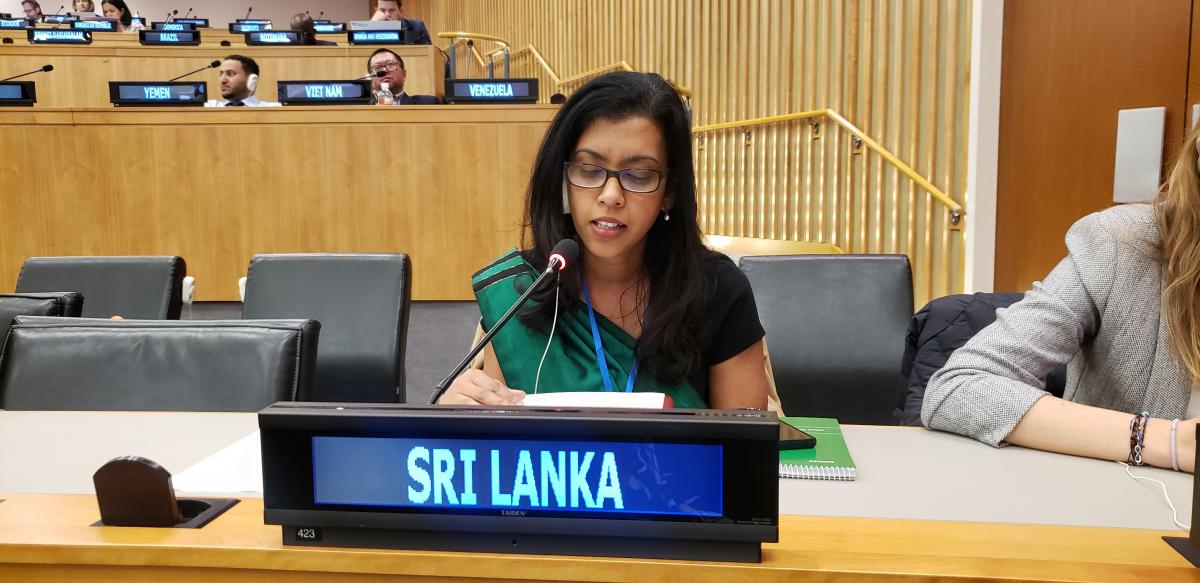
74th Session of the United Nations General Assembly
Statement by Ms. Savitri Panabokke, Minister
Permanent Mission of Sri Lanka to the United Nations
Agenda Item 24: Agriculture Development, Food Security and Nutrition

Mr. Chair
Distinguished delegates
At the outset, the Sri Lanka delegation associates itself with the statement made by the distinguished representative of the State of Palestine on behalf of the G-77 and China.
Sri Lanka also thanks the Secretary General of the United Nations for his reports under this Agenda item.
Mr. Chair,
Achieving food security, adequate nutrition and promoting sustainable agriculture is crucial to achieving zero hunger, which is at the heart of the 2030 Development Agenda. Despite the concerted efforts of Member States, the Secretary General’s report has revealed that global hunger levels have continued to rise, with 821 million people being undernourished in 2018. That the world is not on track to achieve SDG 2 becomes all the more startling, as we learn that one third of the global population is set to be obese or overweight by 2030.
Global efforts of achieving sustainable agriculture and food security have been hampered by a variety of factors such as climate change, conflict, changing consumption patterns and urbanization. Addressing the complex nature of hunger, food insecurity and malnutrition requires a multi-faceted approach, consisting of action oriented policies and effective implementation measures. In this regard, Sri Lanka welcomes the recommendations contained in the Secretary General’s report which provide a way forward in a timely, pragmatic and sustainable manner.
Mr. Chair,
Sustainable agricultural production is a key element of eradicating poverty and achieving zero hunger. Greater collective effort is required to enhance sustainable agricultural production to achieve food security, especially in developing countries. To this end, Sri Lanka remains firmly committed to enhancing sustainable production through the National Food Production Programme and the Agriculture Sector Modernization Project with the aim of increasing food crops such as rice.
Small holder farmers play an important role in promoting food security and promoting sustainable agriculture. In this regard, Sri Lanka welcomes resolution 72/239 on the United Nations Decade of Family Farming, which promotes food security and environmental sustainability by supporting family farming. Recognizing the important contribution made by small holder farmers to food security and their vulnerability to climate change, the Government of Sri Lanka introduced a crop insurance programme through the Agriculture and Agrarian Insurance Board (AIIB) and cooperatives such as Sanasa, which has partnered with the World Bank and the ILO on this initiative.
Mr. Chair,
Sustainable fisheries and aquaculture plays an important role in promoting food security, while providing nutritious food. It also provides livelihoods to millions of people around the world, especially in island countries such as Sri Lanka. However, global fish stocks are being harvested at unsustainable levels, posing a risk to ecosystems, as well as food security and coastal livelihoods. In this regard, Sri Lanka is firmly committed to eradicating unsustainable fisheries practices and in 2015, introduced the “Sri Lanka National Plan of Action to Prevent, Deter and Eliminate Illegal, Unreported and Unregulated Fishing.”
Adequate nutrition makes an important contribution to eradicate hunger and create a healthy population. In this regard, my country welcomes the UN Decade of Action on Nutrition (2016-2025) and emphasizes the importance of fully implementing the objectives identified therein. Recognizing the importance of childhood nutrition, Sri Lanka has partnered with UNICEF towards improving child and maternal nutrition.
Mr. Chair,
One of the greatest threats to sustainable agriculture, food security and nutrition is climate change. In such a challenging scenario, it is essential to strengthen the resilience of food systems and agriculture production to adapt to the vagaries of climate change. Since 2013, the UNDP has run a project with the Ministry of Environment and the Green Climate Fund to strengthen the resilience of farmers against climate change by improving irrigation systems in the country’s dry zone. In partnership with the government and local stakeholders, the FAO has also targeted rehabilitating and improving irrigation for 150,000 farmers in Sri Lanka, both of wh8ich have assisted the country positively.
In conclusion Mr.Chair, while Sri Lanka continues to build on successful policies, it will persist in its efforts to address gaps and challenges in achieving food security and nutrition. The country remains firmly committing to global efforts on achieving zero hunger by 2030 and building a healthy world of all.
Thank you!


